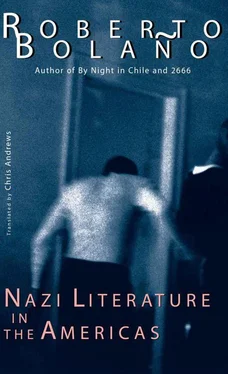Emilio Stevens was going steady (an expression that gives me goose bumps now) with María Venegas, although in fact he often went out with both sisters, to the movies, concerts, plays or lectures, that sort of thing; sometimes they went to the beach in the girls’ car, a white Volkswagon Beetle, to watch the sun sink into the Pacific and smoke some dope. I suppose the Venegas girls went out with other guys, and Stevens probably had other friends too; at the time, we all thought we knew what there was to know about each other’s lives, a fairly stupid assumption, as events were soon to demonstrate. Why did the Venegas sisters get mixed up with him? It’s a trivial mystery, an everyday accident. The man known as Stevens was, I suppose, handsome, intelligent, sensitive.
A week after the coup, in September 1973, in the midst of the reigning confusion, the Venegas sisters left their apartment in Concepción and went back home to Nacimiento. That was where they lived with their aunt. Their parents, both painters, had died before the girls turned fifteen, leaving them the house and some land in the province of Bio-Bio, which provided a comfortable living. The sisters would often speak of them, and their poems often featured imaginary painters lost in the wilds of southern Chile, embarking on hopelessly ambitious works and hopelessly in love. Once, and once only, I had the opportunity to examine a photo of them: the father was dark and thin, with a certain look of sadness and perplexity peculiar to those born on this side of the river Bío-Bío; the mother was taller, slightly chubby, with a sweet, easy-going smile.
They went to Nacimiento and shut themselves up in their house, one of the biggest houses in town, on the outskirts, a two-storey wooden house that had belonged to the father’s family, with more than seven rooms, and a piano, and the powerful presence of the aunt, who kept the twins safe from all harm, although they were not what you would call faint-hearted girls, quite the opposite.
And one fine day, say two weeks or a month later, Emilio Stevens turned up in Nacimiento. It must have happened something like this. One night, or perhaps it was earlier, one afternoon, one of those melancholic southern afternoons, in mid-spring, someone knocks at the door, and it is Emilio Stevens. The Venegas girls are pleased to see him; they bombard him with questions, invite him to dinner and then say he’s welcome to stay the night; and after dinner they probably read out poems, not Stevens, he doesn’t want to read anything, he says is working on something new, smiles in a mysterious, knowing way, or perhaps he doesn’t even smile, just flatly says no, and the Venegas girls approve; in their innocence, they think they understand, but they don’t understand at all, and yet they think they understand, and they read their poems, which are dense and very good: a blend of Violeta and Nicanor Parra and Enrique Lihn, if such a thing is conceivable, a mind-blowing distillation of Joyce Mansour, Sylvia Plath and Alejandra Pizarnik, the ideal cocktail with which to bid the day farewell, a day in 1973, fading irretrievably. And during the night Emilio Stevens gets up like a sleepwalker, perhaps he has slept with María Venegas, perhaps not, at any rate he gets up without hesitation, like a sleepwalker, and goes to the aunt’s room, hearing the motor of a car approaching the house, and then he cuts the aunt’s throat, no, he stabs her in the heart, it’s cleaner, quicker; he covers her mouth and plunges the knife into her heart, then he goes down and opens the door, and two men come into the house that belongs to the stars of Juan Cherniakovski’s poetry workshop, and the fucked-up night comes into the house and then it goes out again, almost straight away, the night comes in, and out it goes, swift and efficient.
And the bodies vanish, but no, years later one will appear in a mass grave, that of Magdalena Venegas, but only hers, as if to prove that Ramírez Hoffman is a man and not a god. Many other people disappeared at that time, like Juan Cherniakovski, the Jewish poet of the South, and no one was surprised that he had disappeared, the Red son of a bitch, although later, following in the footsteps of his putative Russian-Jewish uncle, he turned up in all the trouble spots of Latin America, becoming a legend, the model of the itinerant Chilean: there he was in Nicaragua, El Salvador, Guatemala, with his rifle and his fist in the air, as if to say Here I am, you bastards, the last Jewish Bolshevik from the forests of southern Chile, until one day he disappeared for good, possibly killed during the FMLN’s final offensive. And Concepción’s other poet, Martín García, Cherniakovski’s friend and rival, who held his workshop in the medical faculty, also disappeared. The two of them were always together, talking about poetry. If the sky over Chile had begun to crumble and fall, they would have gone on talking about poetry: the tall, fair-haired Cherniakovski and the short, dark Martín García; Cherniakovski mainly interested in Latin American poetry, while García was translating French poets no one else had heard of. This of course infuriated a lot of people. How could that ugly little Indian presume to translate and correspond with Alain Jouffroy, Denis Roche, and Marcelin Pleynet? Michel Bulteau, Matthieu Messagier, Claude Pelieu, Franck Venaille, Pierre Tilman, Daniel Biga. . who were these people, for God’s sake? And what was so special about this Georges Perec character, published by Denoîl, whose books García was always toting around, pretentious bastard. Nobody missed him. Many would have been glad to hear of his death. Writing this now it seems hard to believe. But García reappeared in exile, like Cherniakovski (whom he no doubt never saw again), first in East Germany, which he left as soon as he could, then in France, where he scraped together a living teaching Spanish and translating for small presses, mainly books by offbeat, early twentieth-century Latin American writers obsessed with mathematical or pornographic quandaries. Later on Martín García was killed too, but that is an entirely different story.
Following the coup, as the flimsy power structure of the Popular Unity government was being torn down, I was taken prisoner. The circumstances of my arrest were banal if not grotesque, but as a result I was able to witness Ramírez Hoffman’s first poetic act, although at that stage I didn’t know who Ramírez Hoffman was or what had befallen the Venegas sisters.
It happened late one afternoon — Ramírez Hoffman was fond of twilight — while I was killing time along with the rest of the prisoners at the La Peña detention center, on the outskirts of Concepción, practically in Talcahuano, playing chess in the yard of our makeshift prison. A few strands of cloud appeared in the sky, which had been absolutely clear. The clouds, shaped like cigarettes or pencils, were black and white at first, then pink, and finally bright vermillion. I think I was the only prisoner looking at them. Then, among the clouds, the airplane appeared. An old airplane. At first a spot no bigger than a mosquito. Silent. It was coming from over the sea and gradually approaching Concepción. Heading for the city center. It seemed to be moving as slowly as the clouds. When it flew over us it made a noise like a damaged washing machine. Then it turned its nose up and climbed, and soon it was flying over the center of Concepción. There, high above the city, the plane began to write a poem in the sky. Letters of grey smoke against the rose-tinged blue of the sky, chilling the eyes of those who saw them. YOUTH. . YOUTH, I read. I had the impression — the mad certitude — that they were printer’s proofs. Then the plane swung around and flew towards us, before turning again to make another pass. This time the line was much longer and must have required great expertise on the pilot’s part: IGITUR PERFECTI SUNT COELI ET TERRA ET OMNIS ORNATUS EORUM. For a moment it seemed the plane would disappear over the horizon, heading for the mountains. But it came back. One of the prisoners, a man called Norberto, who was going mad, tried to climb the wall that separated the men’s yard from the women’s, and started shouting: It’s a Messerschmidt, a Messerschmidt fighter from the Luftwaffe. All the other prisoners stood up. The pair of guards at the door of the gymnasium, where we slept on the floor, had stopped talking and were looking at the sky. Mad Norberto, clinging to the wall, laughed and said that the Second World War had returned to the earth. It has fallen to us, the people of Chile, to greet and welcome it, he said. The plane came back over Concepción: GOOD LUCK TO EVERYONE IN DEATH, I managed to make out. For a moment I thought that if Norberto had tried to jump the wall, no one would have stopped him. Everyone else was frozen, staring up at the sky. Never in my life had I seen so much sadness. The plane came back and flew over us again; it veered around, climbed and returned to Concepción. What a pilot, said Norberto, Hans Marseille himself reincarnate. I read: DIXITQUE ADAM HOC NUNC OS EX OSSIBUS MEIS ET CARO DE CARNE MEA HAEC VOCABITUR VIRAGO QUONIAM DE VIRO SUMPTA EST. The last letters trailed off to the east, among the clouds proceeding up the Bío-Bío valley. The plane itself disappeared completely from the sky for a moment. As if the whole thing were simply a mirage or a nightmare. I heard a miner from Lota say, What’s he written, brother? No idea, came the reply. Someone else said, Just some crap; but his voice quavered. There were more policemen at the entrance to the gymnasium now: four of them. In front of me, Norberto was gripping the wall and whispering: Either this is the blitzkrieg, or I’m mad. Then he took a deep breath and seemed to calm down. The plane appeared again. We hadn’t seen it turn around. Heaven forgive us our sins, said Norberto. He said it out loud, and the other prisoners and the guards heard him and laughed. But I knew that no one really felt like laughing. The plane flew over our heads. The sky was darkening; the clouds were no longer pink, but black. Over Concepción, the silhouette of the plane was barely visible. This time it wrote only three words: LEARN FROM FIRE, which quickly faded into the darkness and disappeared. For a few seconds no one said anything. The policemen were the first to react. They ordered us to get in line and began the nightly head-count before shutting us in the gymnasium. It was a Messerschmidt, Bolaño, I swear to God, Norberto said to me as we went in. Sure, I said. And it wrote in Latin, Norberto said. Yes, I said, but I didn’t understand anything. I did, said Norberto, it was about Adam and Eve, and the Holy Virago, and the Garden of our heads, and he wished us all good luck. A poet, I said. Polite, anyway, said Norberto.
Читать дальше












